Custom to be followed in Japan
When you travel around Japan, you must know some unique Japanese customs.
You may think they are curious. But Japanese people think they are natural.
When you enter house or ryokan, you must take off your shoes.
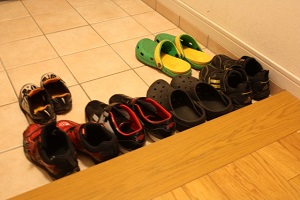
Shoes of visitors at the entrance of Japanese house
Generally, the entrance of Japnese house is the place that you take off or put on the shoes.
You can probably find some pairs of shoes at the entrance.
That is the evidence that someone is in the house.
The floor of traditional Japanese house is a little higher than the ground.
And tatami mats and wooden boards are laid on the whole floor.
The structure protects the house from dampness.
Therefore, soiled and wet shoes must be taken off outside the house.
This is Japanese house.
In some houses, the host recommends to you that you put on slippers after you have taken off your shoes at the entrance.
In such house, the family walk around only on wooden floor with slippers.
But you must take off the slippers when you enter Japanese room with tatami flooring.
When you enter a public bathroom, you must get naked
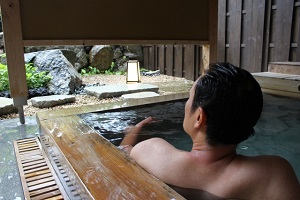
Bathtub in an onsen
Japanese people like to get into the bath.
Especially, many people enjoy to soak in the hot water up to the shoulders.
When we enter the bathroom, we must get naked even if it is a public bath.
No people wears a swimsuit in any public bath and outdoor bath.
Of course, the public bath has separete rooms for men and women.
You have no need to be ashamed. It is nature for Japanese people.
All Japanese people aren't shy in the public bath.
Additionally, there are some unspoken rules when you have the public bath.
- Before you enter a bathtub, wash your sweat off with shower or a tub of water.
- Don't use your towel in the bathtub. (Putting it on top of your head is OK.)
- Even if the bathtub is very large like a pool, don't swim or dive in the bathtub.
- The washing places with a shower, faucets and a small stool are shared. You shouldn't keep a place.
In general, Japanese people have a bath in the evening.
After a day's work, they have a bath to wash away the sweat and relieve fatigue.
Therefore, many Japanese people have a bath between evening dinner and bedtime.
Some doctors say that it is the best to have a bath two hours before going to bed.
If you have a tattoo, you may be refused to enter a public bath.
In Japan, tattoo has been hated since from ancient times.
Until 1948, it had been prohibited by law.
But, because only gangsters have been tattooed since that, most Japanese people think that tattoo is an antisocial thing.
Recently, tattoo as a fashion is done among some people, but many people don't have a good feeling about it.
Therefore, in many public bathes, ryokan (Japanese-style hotel) and onsen (hot spring), tattooed person is refused to enter a bath.
If you have a tattoo, please pay attention.
Japanese people don't have the custom of tipping.
While you are in Japan, you need not give a tip.
Japanese people don't have the custom of tipping.
Even if you give a tip in Japan, most Japanese people probably decline that politely.
On the contrary, when Japanese people travel to foreign countries, they are puzzled by the custom of tipping.
Japanese greeting is to bow.
When we meet a person, we bow by lowering the head with message of greetings.
Probably you will find many bowing during you are in Japan.
To bow is to show respect.
In all sports originated in Japan such as Judo and Sumo, bowing is the first action and the last action after the match is also bowing.
This is one of Japanese cultures, and bowing is trained within the daily life from childhood.
To shake hand and to embrace are the limited actions.
These actions are Western style, and we do when both persons are familiar and in a casual atmosphere.
Basically, Japanese people don't touch each other unless both persons are familiar.
(This may be a reason that COVID-19 has not spread in Japan less than countries of the Europe and America.)
Cars are driven on the left side of the road.
Japanese drivers must keep to the left side of the road.
This is opposite to many countries.
If you are living in such country, you must be careful when you walk across the road.
Cars are running in the opposite direction which is different from your experience in your country.
Anyway, watch out for traffic when you walk around.
In restaurant and cafe, a cup of tea or water served at first is free of charge.
Japan is water-rich country.
Additionally drinkable and tasty water is supplied.
So Japanese people consider water as air.
In many restaurants and cafes, a waitress brings a cup of tea or water at first.
This is free of charge.
And, you can ask for a second helping.
(In some restaurants, the waitress comes and says to you, "How about having another one?")
But never leave the restaurant without order of dish!
We eat boiled rice and miso-soup with the bowl held up
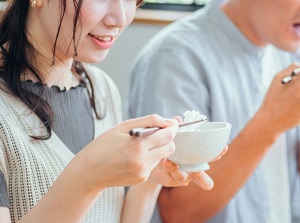
How to eat boiled rice
Boiled rice is Japanese staple food and miso-soup is traditional soup.
The essence of Japanese meal is to eat them.
These are put in small bowl.
We use chopsticks to eat.
But it is difficult to eat the foods in the bowl on the table with chopsticks.
Therefore, we eat boiled rice and miso-soup with the bowl held up.
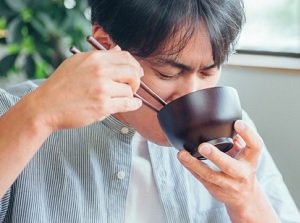
How to eat miso soup
You hold chopsticks on your dominant hand, so you can use the other hand to hold up a bowl.
Then, you can put the food into your mouth from the bowl close to the mouth with chopsticks.
And we eat miso-soup from the bowl directly like drinking coffee from a cup.
Because, chopsticks can't spoon up liquid soup.
But we never hold large plates up.
This way is only for small bowl or plate.
We permit to make slurping sounds when we eat noodles
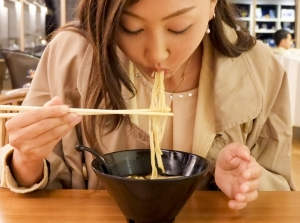
Slurping udon noodle
In Japan, there are some kind of noodles such as udon, soba, ramen, etc.
When you enter the noodle restaurant, you will hear slurping sounds.
You may feel unpleasant.
But, it is not against manners in Japan.
Rather, the sound gives us an appetite.
We permit to make slurping sounds when we eat udon, soba or other noodle.
This is the unique manner in the world.


